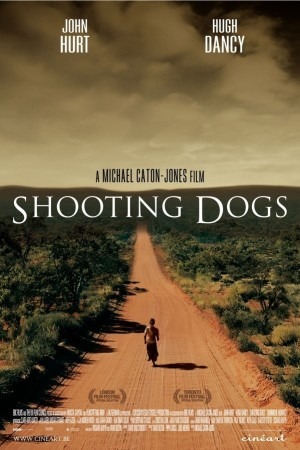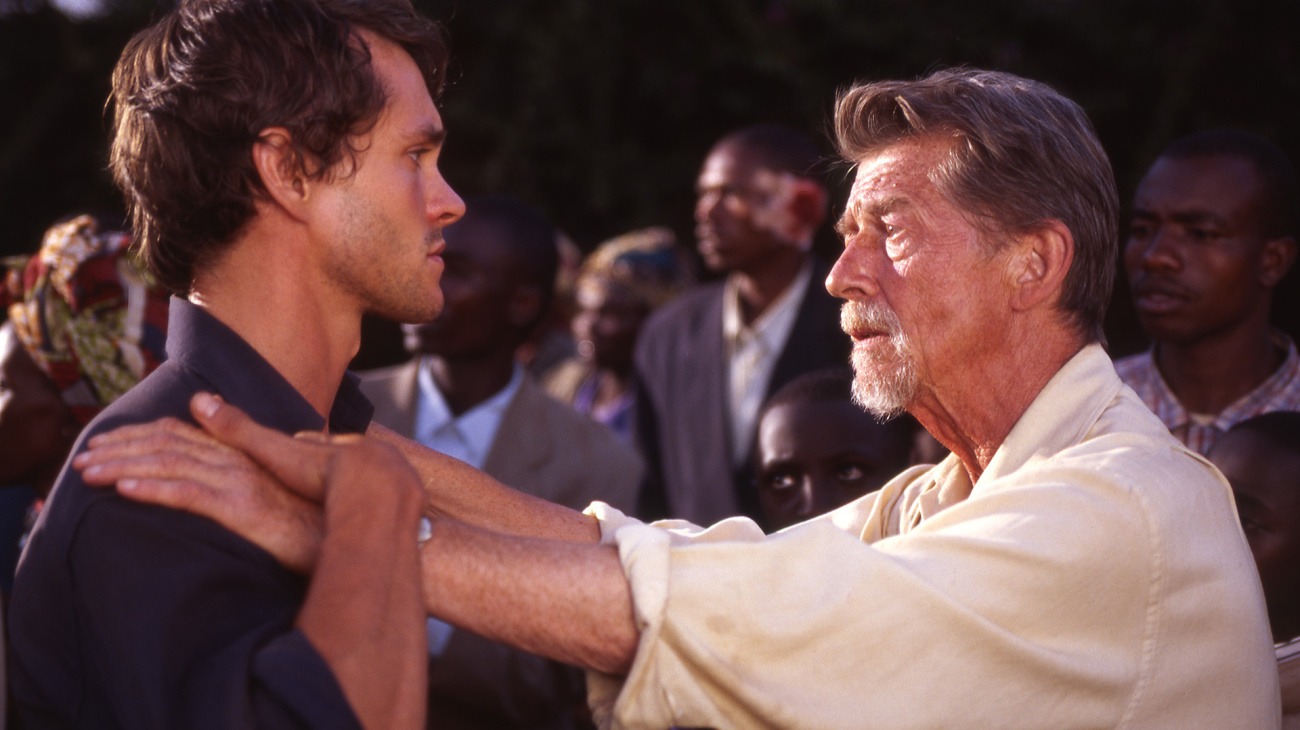
Whitey sucks
I've been as loud as anyone in my distaste for the recent subgenre, "hideous African tragedies viewed primarily in terms of how they affect white people," and yet here we have Shooting Dogs (bizarrely renamed Beyond the Gates for the US, a worse title by every measure that isn't marketing), a story about two white men caught up in the early days of the Rwandan genocide of 1994, and it is extraordinarily good.
After much thought, I have come to the conclusion that this is because Shooting Dogs isn't "about" the genocide in the way that Hotel Rwanda was. It is very much "about" the white people, because it is "about" the tremendous failure of the Western response to the crisis.
Loosely inspired by true events, the film relates the story of Father Christopher (John Hurt), the British priest overseeing the École Technique Officielle in the capital city Kigali, and Joe (Hugh Dancy), the idealistic young man spending time in that country to do good. After the first genocidal attacks on 6 April, the ÉTO becomes a makeshift refugee camp, and the local base of operations for a Belgian UN team led by Captain Delon (Dominique Horwitz). And later still (spoiler alert, but come the hell on), the UN pulls out, Joe leaves with them, and Christopher stays to do what he can to help the refugees and dies before the night is out.
Most films in the Africa-in-crisis genre are primarily didactic: their main reason for being is to awaken the (white American) audience to the depravities going on all over that continent. Shooting Dogs moves past that, into the realm of outright accusation. It's easy to say "we stood by while Africa warred," but quite another to dramatize that with the same hellish intensity on display here. In the film as in reality, the UN Peacekeepers were worse than useless, standing around and waving their guns as masses of people were butchered with machetes. In the potent scene that gives the film its title, the Belgians shoot down packs of disease-carrying dogs eating the corpses around the ÉTO compound; that is their full contribution to making Rwanda a safer place. Otherwise, they are babysitters for the Europeans who found themselves swept away in the violence of the country.
Then, there's Joe, whose very name suggests how typical he is: a well-intentioned young man who spends most of the film worrying about how he can help the Rwandans, and at the end, when push comes to shove and he must finally make a real sacrifice, he packs up and leaves. Joe is horribly recognizable in all the smart, hopelessly naïve rich kids who want to make a difference but unconsciously view the Third World as a sort of exotic vacation destination. For him, helping out means coaching the local youths in track and field, but in the face of actual suffering, he folds.
Neither Joe nor Delon is precisely ignorant; they're incapable but moral men, whose impotence causes them great pain. And of course, their great pain is nothing. It does not change the suffering of the Rwandans in the slightest. Given that the stock position of the West is to assume that our guilt obviates our inaction, this pretty harsh medicine indeed.
Director Michal Caton-Jones (who, impossibly, went on next to craft Basic Instinct 2) films the proceedings with a steady, unsentimental hand. Nor does he indulge in the increasingly typical faux-documentary style of grainy stock, oversaturated colors and handheld cameras. The point-of-view is simply that of an observer, outside of the events (a wise choice; how could a mere movie capture what it must have been like in Rwanda, in 1994?). Most stories of this kind try to force emotion with stirring music and gauzy footage with harsh backlights, but not Shooting Dogs. It simply presents, and assumes that we have the inherent morality to understand that what we are watching is evil.
None of this is to say that Caton-Jones doesn't do anything, I should hasten to add. Indeed, he hits upon a rather effective motif of separating the safety inside the ÉTO from the hellscape outside by a contrast between neatly ordered compositions and sloppy, almost indifferent frames. As the ETO becomes less secure, the compositions likewise become less ordered and more chaotic, and the quiet interiors give way to noisy exteriors. In essence, art itself breaks down in the face of violence. It's a subtle thing, but moving.
"Moving" is the key word here. Shooting Dogs is a deeply moving film, because above and beyond the A-plot about venal white people, it is a film deeply invested in the fact of the genocides. First and above all, it was filmed at the very site of the real life École Technique Officielle. Werner Herzog speaks of the "voodoo of location," the idea that place dictates the kind of movie that can be filmed, and Shooting Dogs makes exemplary use of that. Caton-Jones's direction is extremely physical - it underscores the reality of the dust and dirt and trees and buildings - and as the film moves forward it becomes increasingly difficult to separate the events from the place.
More importantly, this was a film made with strong contribution of the survivors of the genocide, some of whom were actors, some of whom were crew. For most of the film, this doesn't "take"; and then, at the end, the faces of the survivors are brought up, with a brief description of the love ones they lost in 1994, and the reality of that loss is crushing. It's no longer a movie, and not quite a documentary. Like the rest of the film, it simply posits, "this is what happened" without making any further judgment, leaving the interpretation to the audience. That's the point that I started crying. I've said this before: any movie that makes me cry did something pretty damn right.
8/10
After much thought, I have come to the conclusion that this is because Shooting Dogs isn't "about" the genocide in the way that Hotel Rwanda was. It is very much "about" the white people, because it is "about" the tremendous failure of the Western response to the crisis.
Loosely inspired by true events, the film relates the story of Father Christopher (John Hurt), the British priest overseeing the École Technique Officielle in the capital city Kigali, and Joe (Hugh Dancy), the idealistic young man spending time in that country to do good. After the first genocidal attacks on 6 April, the ÉTO becomes a makeshift refugee camp, and the local base of operations for a Belgian UN team led by Captain Delon (Dominique Horwitz). And later still (spoiler alert, but come the hell on), the UN pulls out, Joe leaves with them, and Christopher stays to do what he can to help the refugees and dies before the night is out.
Most films in the Africa-in-crisis genre are primarily didactic: their main reason for being is to awaken the (white American) audience to the depravities going on all over that continent. Shooting Dogs moves past that, into the realm of outright accusation. It's easy to say "we stood by while Africa warred," but quite another to dramatize that with the same hellish intensity on display here. In the film as in reality, the UN Peacekeepers were worse than useless, standing around and waving their guns as masses of people were butchered with machetes. In the potent scene that gives the film its title, the Belgians shoot down packs of disease-carrying dogs eating the corpses around the ÉTO compound; that is their full contribution to making Rwanda a safer place. Otherwise, they are babysitters for the Europeans who found themselves swept away in the violence of the country.
Then, there's Joe, whose very name suggests how typical he is: a well-intentioned young man who spends most of the film worrying about how he can help the Rwandans, and at the end, when push comes to shove and he must finally make a real sacrifice, he packs up and leaves. Joe is horribly recognizable in all the smart, hopelessly naïve rich kids who want to make a difference but unconsciously view the Third World as a sort of exotic vacation destination. For him, helping out means coaching the local youths in track and field, but in the face of actual suffering, he folds.
Neither Joe nor Delon is precisely ignorant; they're incapable but moral men, whose impotence causes them great pain. And of course, their great pain is nothing. It does not change the suffering of the Rwandans in the slightest. Given that the stock position of the West is to assume that our guilt obviates our inaction, this pretty harsh medicine indeed.
Director Michal Caton-Jones (who, impossibly, went on next to craft Basic Instinct 2) films the proceedings with a steady, unsentimental hand. Nor does he indulge in the increasingly typical faux-documentary style of grainy stock, oversaturated colors and handheld cameras. The point-of-view is simply that of an observer, outside of the events (a wise choice; how could a mere movie capture what it must have been like in Rwanda, in 1994?). Most stories of this kind try to force emotion with stirring music and gauzy footage with harsh backlights, but not Shooting Dogs. It simply presents, and assumes that we have the inherent morality to understand that what we are watching is evil.
None of this is to say that Caton-Jones doesn't do anything, I should hasten to add. Indeed, he hits upon a rather effective motif of separating the safety inside the ÉTO from the hellscape outside by a contrast between neatly ordered compositions and sloppy, almost indifferent frames. As the ETO becomes less secure, the compositions likewise become less ordered and more chaotic, and the quiet interiors give way to noisy exteriors. In essence, art itself breaks down in the face of violence. It's a subtle thing, but moving.
"Moving" is the key word here. Shooting Dogs is a deeply moving film, because above and beyond the A-plot about venal white people, it is a film deeply invested in the fact of the genocides. First and above all, it was filmed at the very site of the real life École Technique Officielle. Werner Herzog speaks of the "voodoo of location," the idea that place dictates the kind of movie that can be filmed, and Shooting Dogs makes exemplary use of that. Caton-Jones's direction is extremely physical - it underscores the reality of the dust and dirt and trees and buildings - and as the film moves forward it becomes increasingly difficult to separate the events from the place.
More importantly, this was a film made with strong contribution of the survivors of the genocide, some of whom were actors, some of whom were crew. For most of the film, this doesn't "take"; and then, at the end, the faces of the survivors are brought up, with a brief description of the love ones they lost in 1994, and the reality of that loss is crushing. It's no longer a movie, and not quite a documentary. Like the rest of the film, it simply posits, "this is what happened" without making any further judgment, leaving the interpretation to the audience. That's the point that I started crying. I've said this before: any movie that makes me cry did something pretty damn right.
8/10
Categories: british cinema, war pictures, white people in africa






